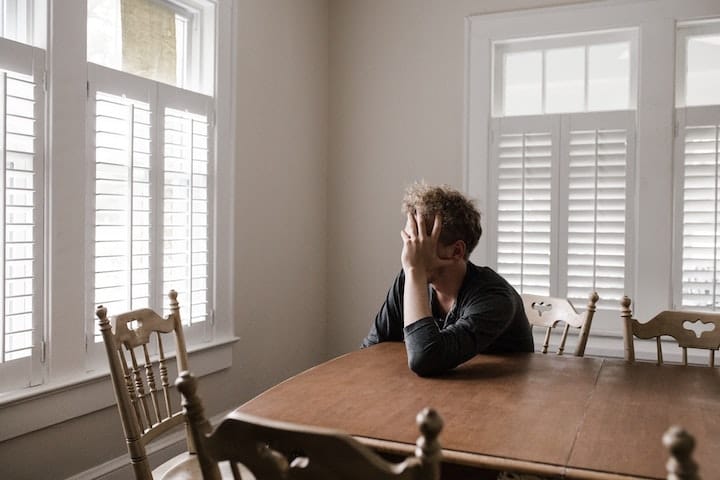Unfortunately, suicide remains a leading cause of death worldwide [1].
In fact, studies have shown that there is a strong link between what is known as suicidal ideation and addiction issues.
This is because many illegal drugs, such as cocaine and heroin involve what is known as a ‘come down’ which is a drop in serotonin levels.
This means that if you abuse drugs or alcohol on a regular basis, then you might be at risk of suicidal ideation.
Likewise, people who suffer from substance abuse also experience a lot of the same causation factors for depression or suicidal thoughts, such as financial issues, a breakdown of relationships and an erratic lifestyle.
If you or someone you know are experiencing suicidal thoughts or suicidal ideation, then it’s important to seek help.

Suicidal ideation is when someone is thinking about suicide but does not make an attempt at taking their life [2].
Someone might think about suicide on a regular basis, such as every day, whereas for others it might be less often.
Likewise, someone might only experience suicidal ideation when they are triggered to.
There are a number of triggers that might lead to suicidal ideation, such as losing someone you love, struggling with money or arguing with people you care about.
In fact, there are two main types of suicidal thoughts or ideation [3].
The first type of suicidal thought is called a passive suicidal thought. This is where you have no plans to take your own life or harm yourself, but you have a vague desire to die or end your life.
This includes wishing you were never born or thinking that people would be better off without you around [3].
The second type of suicidal thought is called an active suicidal thought. This is the type of thought where you have intention to die by suicide, and you might even start to think about how you would do it [3].
Naturally, this type of suicidal ideation is more severe and should be an immediate cause for concern.
If you or someone you love is experiencing either passive or active suicidal thoughts, then it is important to seek help.
Likewise, whilst passive suicidal thoughts are less severe compared to active thoughts, they are also a major cause for concern and should still be taken seriously.
This is because passive suicidal thoughts can quickly escalate to active thoughts, or even suicide attempts.
Likewise, whilst suicide is more common among people with a psychiatric illness or addiction issue, it can happen to anyone.

It is important to understand that life is full of many ups and downs. It’s impossible to feel happy all of the time.
However, if you find yourself feeling down, sad or depressed more often than not, then this is a cause for concern.
Feeling depressed and suicidal is not something you need to put up with, and there is help available to you.
Sometimes, it’s difficult to understand how you’re feeling, especially when you’re feeling low or depressed.
Below is a list of what suicidal thoughts can look and feel like:
Whilst feeling a few of these things might not necessarily mean that you are wishing to take your own life, it might mean that you’re struggling mentally or suffering from depression.
This can lead to suicidal thoughts or ideation if you do not get the help and support that you need and deserve.

Addiction is a treatable, chronic disease and should be viewed as one.
People who struggle from an addiction are not always in control of what they do, or how they act.
People who engage in substance abuse engage in behaviours that become compulsive, which they are no longer in control of.
The longer an addiction substance issue goes untreated, the worse it will get [4].
There are a whole host of substances you can become addicted to, including alcohol, cocaine, heroin, cannabis or prescription drugs.
You are addicted to drugs if you no longer feel in control of your actions, and are struggling to stop consuming the substance.
You might also be addicted to a substance if you feel that your tolerance has increased. This means that you need to consume more of the substance in order to feel the same effects.
If you or someone you know is addicted to drugs, then it is important to seek help.
There are a whole host of signs and symptoms that someone is addicted to drugs, such as frequent lying about their use, smelling of alcohol or cannabis, acting erratically, feeling depressed or angry or a general lack of hygiene.
Substance abuse is linked to suicidal ideation, meaning that if you abuse drugs or other substances, such as alcohol on a regular basis then you are more likely to suffer from suicidal thoughts or ideation.
In fact, studies have shown that approximately 50% of people who take their own life are dependent on drugs or alcohol at the time they take their life [6].
This figure is staggering and highlights the link between substance abuse and suicide.
Research has shown that people who abuse drugs and alcohol experience a lot of the causation factors for suicide.
This includes feeling hopeless, struggling financially due to the sheer cost of their addiction, arguing with people on a regular basis, a lack of employment and a general breakdown of relationships.
Likewise, people who experience a drug and alcohol addiction also have altered brain chemistry, which means that they experience withdrawal symptoms when they are sober or clean, which can lead to depression.
It is also important to discuss and understand that people tend to use substances, such as heroin and alcohol as a crutch when they are feeling low.
As many people these substances give you an initial ‘high’ a lot of people abuse them on a regular basis in order to escape feelings of sadness or depression.
However, as your tolerance increases, they will always do more harm than good.

Suicide rates have risen across the UK over the past decade. This is a disturbing fact, and it’s important to understand why this has happened.
In fact, the Samaritans cite low socio-economic status as one of the leading causes of suicide across the UK [5].
They released a study which highlighted that money struggles are one of the leading causes of suicide, and with rising energy bills and the cost of living crisis continuing to take effect, more people than ever are struggling financially and therefore, mentally.
Likewise, more people than ever are struggling from a form of addiction.
This includes addiction to both drugs and alcohol and studies have shown that substance addiction is strongly linked to suicidal ideation and even suicide attempts.
There are a whole host of reasons why people might experience suicidal thoughts or ideation.
It is important to remember that suicidal thoughts or ideation can happen at any time, but it’s also important to acknowledge that they can be triggered by certain events or situations.
Below is a list of some of the most common factors that could lead someone to experience suicidal ideation:
There are a whole host of other reasons why someone might be experiencing suicidal ideation or thoughts.
It is important to keep an eye out for certain signs and symptoms that someone is struggling, as well as being aware that people might be more prone to these types of thoughts if they have experienced some of the above triggers.

Coping with and overcoming an addiction issue alongside thoughts of depression is not easy, but it is possible.
Coping and overcoming suicidal ideation and addiction issues starts with taking the first step. It is important to seek professional help, especially if you are suffering from a severe addiction issue.
However, there are some steps that you can take today alongside getting professional help.
If you are struggling with addiction issues, then the best thing that you can do is to set a quit date. You should choose a date that means something important to you, such as your birthday or the date you lost a loved one.
This should help you honour your commitment.
It is sometimes easier to stick to change when you change your environment. Try moving house or moving towns or simply changing the places or people you tend to spend the most time at or with.
This will help you process the distinction between then and now. However, it is important not to move away from your support network, as they will be a huge help to you as you continue your recovery.
Often, who we spend the most time with will determine how we behave.
You should try to create a supportive network of people around you whilst you recover and try to distance yourself from anyone who might be encouraging your addiction or damaging your mental health.
One of the most productive things that you can do to aid your recovery is to seek professional help.
This could include getting therapy or attending inpatient or outpatient rehab as well as undergoing a detox from your substance addiction.

Supporting a loved ones with a mental health issue is never easy, especially if they are experiencing suicidal ideation.
However, there are a number of things that you can do in order to offer them support and help them through this tough time.
Some of these things are listed below for you:
If you or someone you know is suffering from an addiction issue or suicidal ideation, then talk to a member of the team at Rehab 4 Addiction.
Our team of professionals will be able to talk you through the options available to you and will talk you through the process of recovery. For treatment enquiries, call our team on 0800 140 4690.
[1] https://pubmed.ncbi.nlm.nih.gov/26772209/
[2] https://pmc.ncbi.nlm.nih.gov/articles/PMC8429339/#wps20909-bib-0001
[3] https://onlinelibrary.wiley.com/doi/10.1111/sltb.12935
[4] https://www.asam.org/quality-care/definition-of-addiction